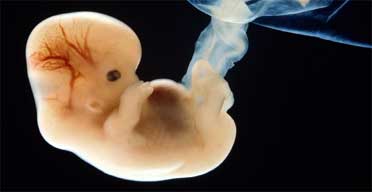
British scientists announced today an advanced screening test for embryos, using a form of DNA fingerprinting, which could help prevent couples passing inherited disorders such as cystic fibrosis on to their children.
Developed at Guy's hospital in London and unveiled at a conference on fertility in Prague, the technique is similar to the genetic fingerprinting used by police to identify suspects.
Instead of searching for a specific altered gene linked to an inherited illness - which can vary according to the family involved - the test looks for the more uniform chromosomal DNA fingerprints, or markers, near the gene.
The technique, called pre-implantation genetic haplotyping, or PGH, will assist couples at high risk of passing on serious illnesses to their children by ensuring that only healthy embryos are used for in-vitro fertilisation (IVF).
It takes about two months and has the potential to detect many more disorders than the current standard screening test, known as pre-implantation genetic diagnosis (PGD), which identifies specific mutations in genes.
For example, about 1,000 mutations are thought to cause cystic fibrosis, but only one, the most common, can be identified by PGD.
"We don't have to know the precise details of a mutation, just whereabouts it is in the genome," Professor Peter Braude, who developed the technique at Guy's hospital, said of the new method. "It is more accurate and reliable than PGD and could be available for a whole range of disorders."
Five women are now expecting healthy babies via IVF treatment after using the new test. Scientists hope it could eventually help hundreds of couples in Britain every year.
Three of the five couples carry genetic defects for cystic fibrosis that would not be picked up by PGD, while the other two cases involve the muscle-wasting disorder Duchenne's muscular dystrophy.
For the test, blood samples are taken from a couple and any affected children or relatives, and DNA from these samples is tested and compared.
Using a technique to create many more copies of chromosomes in the laboratory, scientists look for markers that show if an embryo carries the problem chromosome or a disease-free version.
"You can actually track the gene through the family without looking at the gene. You can see which embryos are affected and which are not," Alison Lashwood from Guy's told Reuters.
The technique is similar to forensic DNA tests, which search for specific short sequences of DNA from a suspect and compare them against patterns in DNA taken from a crime scene.
The Guy's team presented their findings to the annual meeting of the European Society of Human Reproduction and Embryology, which opened in Prague today.
The findings were welcomed by the British Fertility Society, which represents fertility clinics.
"Any technique which has the potential to reduce the risk of serious, debilitating and potentially life-threatening disease has to be greeted with some enthusiasm," said Mark Hamilton, the chairman of the society.
However Josephine Quintavalle, of the pressure group Comment on Reproductive Ethics, condemned the new method.
"I am horrified to think of these people sitting in judgment and deciding which embryos should live and which should die," she said. "The goalposts are already getting wider and wider."

